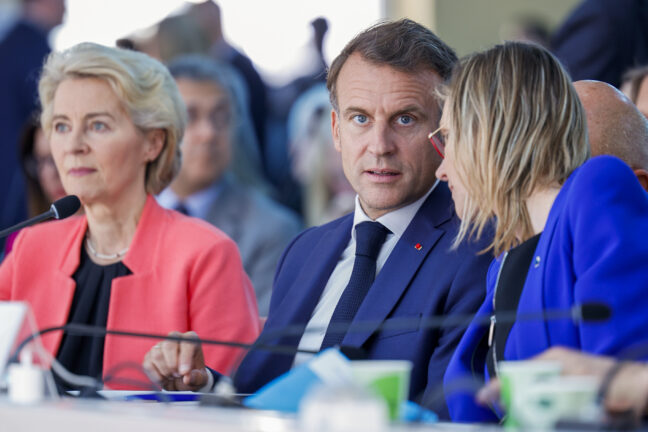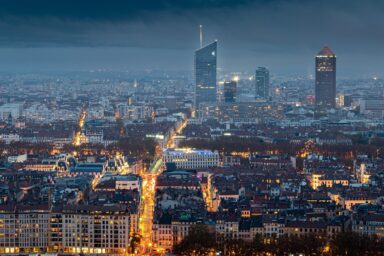French President Emmanuel Macron is coming to the EU Council summit today seeking to alter the course of discussions regarding climate targets. He wants the European Commission to delay the proposed emissions reduction target for 2040.
Reports by various European press outlets indicate that Mr Macron has garnered support from Poland, with an uncertain number of other member states expressing similar sentiments. The pushback against the Commission’s ambitious climate agenda—and to shift focus to more manageable commitments— reflects a growing unease among member states about the feasibility of meeting such targets.
The Commission, facing mounting pressure, has already postponed its formal proposal for the 2040 target. Initially scheduled for February, the plan to achieve a 90 per cent reduction in greenhouse gas emissions by 2040 now awaits approval. While the Commission aims to present this proposal during the summit, the prevailing negative sentiment among member states casts doubt on its acceptance. Mr Macron’s efforts to advocate for a more lenient approach signal a strategic move to align member states under a banner of caution regarding future emissions targets.
Hand in hand
Consensus remains elusive at the summit, with many countries advocating for more flexibility in the Commission’s proposals. They call for a technology-neutral approach and the inclusion of international certificates in accordance with Article 6 of the Paris Climate Agreement.
Mr Macron’s fears of political isolation complicate matters further. A significant emissions reduction target poses a challenge domestically, particularly amid concerns about burdens on citizens stemming from the EU’s Emissions Trading System (ETS2).
You might be interested
Benjamin Haddad, France’s minister for Europe, ducked a related question by Politico, saying instead, “Decarbonization and competitiveness must go hand in hand. Before rushing towards a new objective, let’s specify how we are going to achieve it and provide pragmatic support for our economic players.”
Deliberations and challenges
France, as the host of the Paris Climate Agreement, risks being perceived as a hindrance to EU climate progress if it votes against a 90 per cent target. Observers suggest that Mr Macron’s strategy aims to avoid such perceived embarrassment by dismantling the target altogether. Additionally, France prefers to maintain a conservative climate target for 2035. Rather than committing to a specific goal for 2040, France would like only to establish the Nationally Determined Contribution (NDC) for 2035 during a subsequent Environment Council meeting in September.
Before rushing towards a new objective, let’s specify how we are going to achieve it and provide pragmatic support for our economic players. – Benjamin Haddad, French Europe minister
The proposal to establish a lower target for 2035 contrasts sharply with the Commission’s intentions. While the Commission indicates a preference for a linear path from the 55 per cent CO₂ reduction in 2030 to 2050, which would imply a 72.5 per cent target for 2035, France pushes for a target in line with the longer-term objectives of achieving climate neutrality by 2050. Such a reduction of 66.25 per cent my come across as a long-overdue whiff of realistic thinking, or as an unwelcome retreat from prior commitments.
Germany’s stance on climate policy
In response to France’s maneuvering, the German government remains steadfast in its support for a 90 per cent emissions reduction target. Despite acknowledging France’s proposals, German officials assert that their position remains unchanged. The coalition partners in Germany have committed to supporting the Commission’s proposals if they include allowances for international certificates under Article 6. It appears that the Commission is gearing up to present this proposal next week, adding further complexity to the discussions.
For Friedrich Merz, the Bundeskanzler, this summit represents a critical test of leadership. However, he expresses greater concern over regulatory burdens, advocating for a more vigorous administrative simplification within the EU. Mr Merz has already called for the withdrawal of the supply chain directive and seeks to suspend other Green Deal projects. The divergent views among member states could lead to heated debates, but many diplomats anticipate that these issues will not dominate discussions at the summit.
As the evening discussions commence, heads of state and government will address trade conflicts with the US administration. Since the EU Commission’s recent proposal, member states await a response from Washington. Mr Merz, alongside Mr Macron and Giorgia Meloni, Italy’s Prime Minister, is keen to expedite negotiations, focused on securing swift agreements that prioritise essential sectors.
Global leadership implications
As France seeks to alter the timeline for the EU’s next significant climate goals, the ramifications of such decisions extend beyond mere policy adjustments. A call to decouple the 2035 and 2040 targets threatens the EU’s leadership role in global climate negotiations—or, as others might argue, would pull it back from the brink of ideology-based self-harm. France’s alignment with historically reluctant partners such as Poland and Hungary raises questions about the bloc’s unity on climate issues.
As the September deadline for the NDC submissions looms large, EU diplomats are acutely aware of the implications of a delayed or diluted response. If the EU fails to submit its contributions in a timely manner, its influence over the global climate agenda will wane. This, again, may be either welcomed as a return to sobriety, or a bitter disappointment. A weak showing may embolden other nations to soften their commitments, undermining—for better or worse—the collective efforts embodied in the Paris Agreement.
The EU, which has urged other nations to adhere to deadlines, risks appearing hypocritical if it cannot fulfill its own commitments. The urgency surrounding these climate discussions highlights the need for a cohesive strategy that encompasses both ambition and pragmatism.










